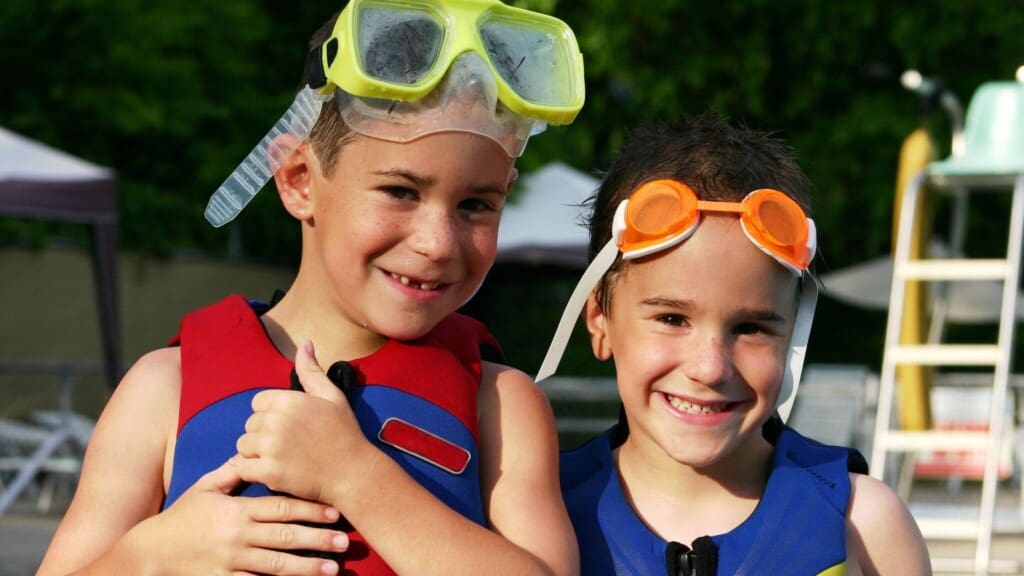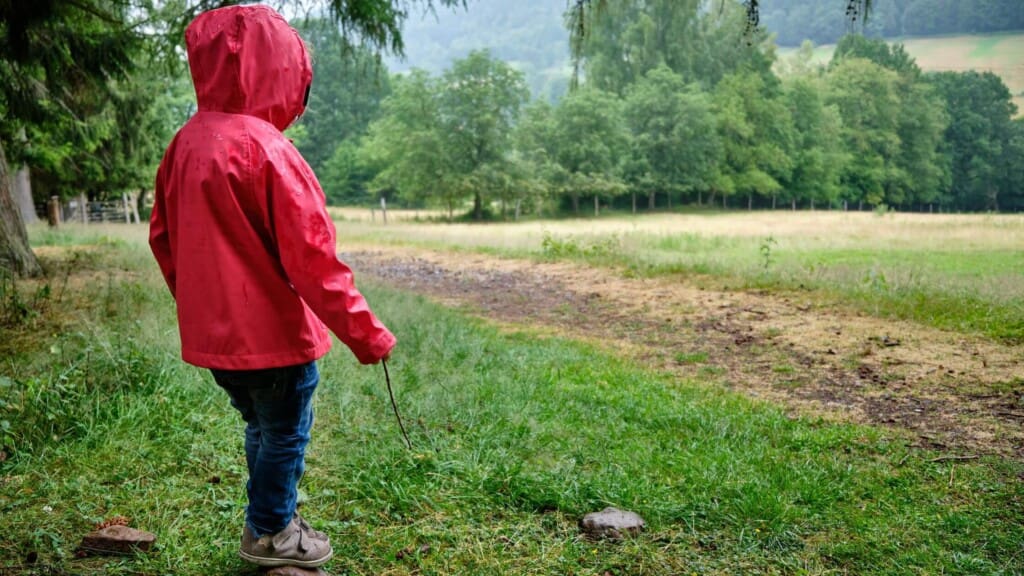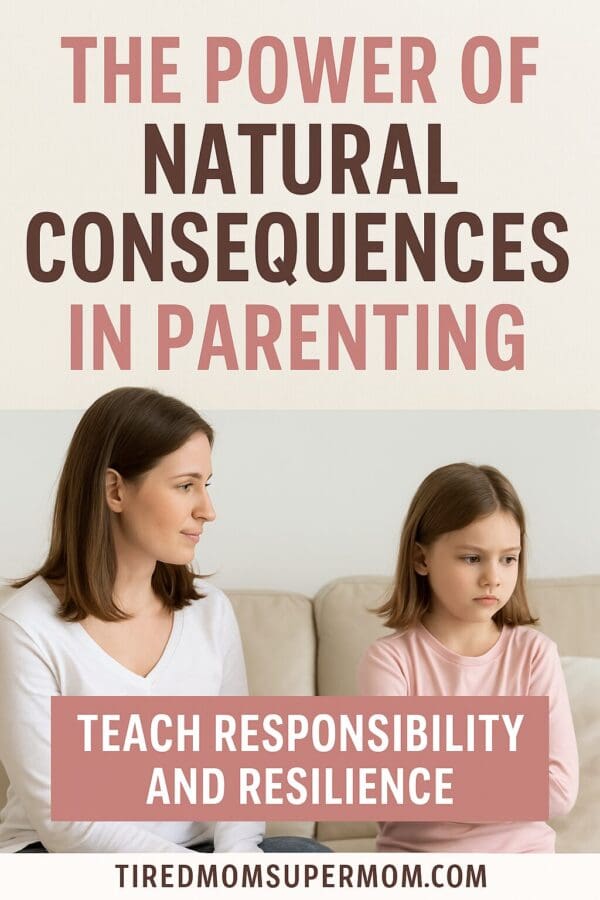5 Powerful Ways Natural Consequences in Parenting Build Responsibility and Resilience
One of the most effective ways to build responsibility, critical thinking, and resilience in children is through natural consequences in parenting.
Instead of lectures, bribes, or punishments, letting kids experience the direct results of their actions teaches life lessons in a real, memorable way.
In this guide, we’ll explore how natural consequences work, why they are so powerful, and how you can apply them successfully at home.
Heads up: This post may include affiliate links. As an Amazon Associate, I earn from qualifying purchases—at no extra cost to you. Full privacy policy and disclosure here.

What Are Natural Consequences in Parenting?
Natural consequences happen without parent intervention. They are the real-world outcomes that follow a child’s behavior — good or bad — teaching them that every action has a result.
For example:
- If a child refuses to wear a jacket on a chilly day, they feel cold.
- If they forget their homework, they receive a lower grade.
- If they leave a toy outside and it gets ruined, they no longer have that toy.
Natural consequences in parenting allow kids to experience the world’s feedback system without you constantly stepping in to “rescue” or “punish.”
Check out Positive Parenting Solutions’ online course – only $9.99 a month!
Why Are Natural Consequences So Powerful?
Allowing natural consequences builds essential life skills:
- Responsibility: Kids learn they control outcomes based on their choices.
- Problem-solving: Facing real consequences encourages critical thinking.
- Resilience: Mistakes feel tough but manageable, building emotional strength.
- Internal motivation: Kids make better choices for themselves, not because they fear punishment.
According to the American Academy of Pediatrics, positive parenting techniques like allowing natural consequences can significantly boost a child’s independence and self-confidence.
Examples of Natural Consequences in Parenting (Everyday Situations)
- Not wearing a raincoat: The child gets wet and feels uncomfortable.
- Skipping lunch: They experience hunger and understand the importance of eating on time.
- Refusing sunscreen: They get a mild sunburn and learn to protect their skin.
- Leaving toys outside: Toys get damaged or lost.
It’s important to remember: As long as the natural consequence is safe and logical, it’s okay to let it happen.

When Should Parents Step In?
While natural consequences in parenting are valuable, there are important limits.
You should intervene when:
- Safety is at risk: Crossing the street without looking is not a lesson kids can safely learn through consequences.
- Health is endangered: Skipping meals repeatedly or dehydration needs parental action.
- Legal/serious social issues: Stealing or bullying cannot be left to natural outcomes alone.
Think of natural consequences as your first strategy — but always prioritize safety.
How to Use Natural Consequences Successfully
Here’s how to apply natural consequences in parenting without turning it into punishment:
- Stay Calm: No lectures or “I told you so.”
- Let the Consequence Happen: Step back unless intervention is needed for safety.
- Empathize: Offer comfort if the consequence is difficult. (“It’s hard to be cold. Next time, you’ll probably want your jacket.”)
- Reflect Together: Later, discuss what they learned from the situation.
- Stay Consistent: If you rescue them once, they won’t learn as quickly.
Parenting experts at Positive Parenting Solutions recommend keeping your tone neutral — not angry or judgmental — when natural consequences unfold.
Tools to Support Natural Consequences
You can make the process even smoother with a few supportive tools:
- 🛒 Daily Routine Chart for Kids — Helps kids manage tasks independently.
- 🛒 Positive Discipline for Preschoolers Book — A parenting essential for learning about natural consequences.
- 🛒 Magnetic Responsibility Chart — Perfect for visual learners.
- 🛒 Emotion Coaching Book: The Whole-Brain Child — Guides emotional development alongside natural consequences.
- 🛒 Parenting Journal to Track Behaviors — Helps both you and your child reflect on choices and outcomes.
These small tools encourage reflection, independence, and growth without feeling like a “punishment system.”
✨ Grab Your Free Printable Checklist!
Parenting with natural consequences just got easier!
Download your free “Should I Let Natural Consequences Happen?” checklist and keep it handy for everyday parenting moments.
✅ Quick, easy-to-follow guide
✅ Helps you make confident decisions
✅ Supports positive, independent learning for your child

Frequently Asked Questions About Natural Consequences in Parenting
What’s the difference between natural and logical consequences?
Natural consequences happen automatically (getting wet in the rain). Logical consequences are adult-guided and related to the behavior (losing screen time because homework wasn’t done).
My child gets really upset after a natural consequence. What should I do?
It’s okay to offer comfort without rescuing them. For example, “I’m here if you need a hug. It’s tough, but next time will be easier.”
What if the natural consequence seems too harsh?
Use your judgment. If the outcome would cause serious harm or distress, step in and guide them toward a safer learning experience.
How often should I let natural consequences happen?
As often as it’s safe. Daily small moments create a powerful learning environment without needing big lectures.
Are natural consequences effective for toddlers too?
Yes! Just adjust your expectations to their developmental level. Toddlers learn quickly from real outcomes like feeling hungry, cold, or losing playtime.
Final Thoughts: Natural Consequences Build Strong Kids
Natural consequences in parenting offer children the space to learn, grow, and become truly responsible for their actions. When parents step back and let the world teach its lessons — safely and with love — kids grow into resilient, thoughtful adults.
While it’s tempting to jump in and “fix” everything, remember:
Sometimes the best teacher is experience itself.
By using natural consequences consistently and with empathy, you’re giving your child the tools they need for a lifetime of wise decision-making.

